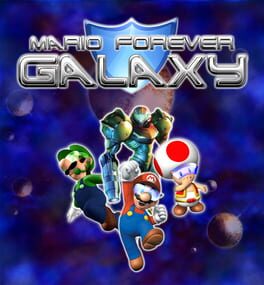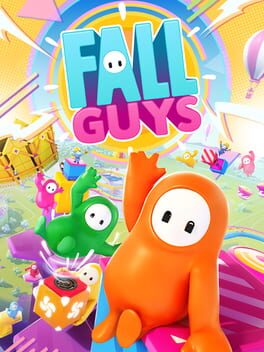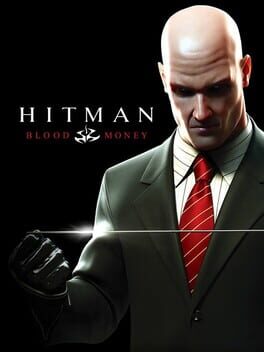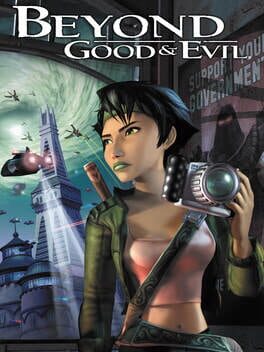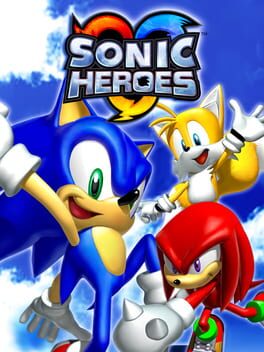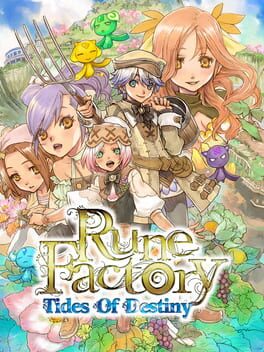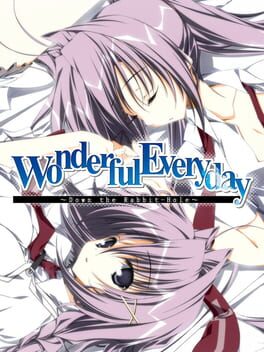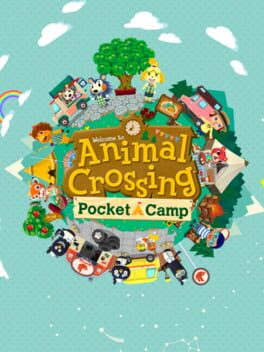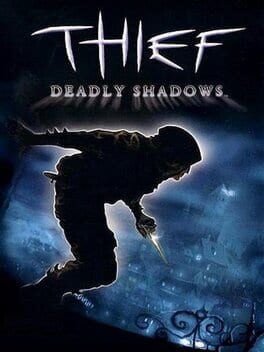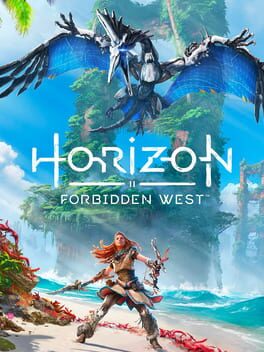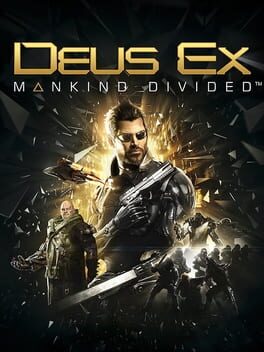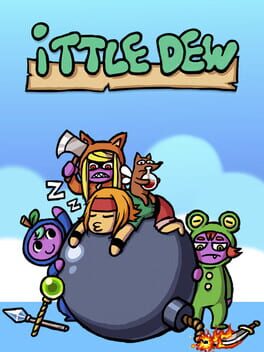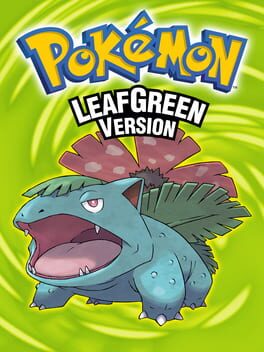proximete
75 Reviews liked by proximete
Mario Forever Galaxy
2008
Fall Guys
2020
Hitman: Blood Money
2006
Beyond Good & Evil
2003
I’m a bit disappointed that this didn’t become a game I would really love because Beyond Good & Evil has just about everything it needed to become a personal favorite. The weird European influenced SciFi/Fantasy world, many of the character designs, the linear action adventure vibe, the occasionally very ambient soundtrack which slaps, and the more calming gameplay features like taking pictures.
However, these concepts, while pretty neat on paper, aren’t done more than they should in the game to make up a more cohesive experience. The story is certainly ambitious in spirit but it never felt too fulfilling to go through and doesn’t leave quite enough intrigue to make me hyped for what would’ve been the next two parts of this planned trilogy. The actual combat isn’t what I, and maybe even the developers themselves, consider to be the real defining point of what makes this game good, which is why it’s pretty simplistic and fairly sparse compared to other gameplay mechanics which make up the experience. But the photography mechanic rarely has much fun outside of a couple mandatory points in the main story, and stealth still feels like it needs some better ironing out to be completely engaging. The final boss really culminated in these weaknesses by just straight up not being fun when I had to go through it the first time.
What Beyond Good & Evil really shines the best though is in its quieter and simpler moments. From taking in the ambient soundtrack while taking pictures of animals in various levels, wandering around the colorfully populated areas of the world, taking part in races while brash spanish music blares, and just vibing with the slick presentation of the game as a whole. Even if I didn’t strongly connect with the story, I do think this is still a pretty unique world worth adventuring in, and I wouldn’t mind having another chance to play around in this sandbox again.
Beyond Good & Evil 2 isn’t that at all so it’s just aimless daydreaming I guess.
However, these concepts, while pretty neat on paper, aren’t done more than they should in the game to make up a more cohesive experience. The story is certainly ambitious in spirit but it never felt too fulfilling to go through and doesn’t leave quite enough intrigue to make me hyped for what would’ve been the next two parts of this planned trilogy. The actual combat isn’t what I, and maybe even the developers themselves, consider to be the real defining point of what makes this game good, which is why it’s pretty simplistic and fairly sparse compared to other gameplay mechanics which make up the experience. But the photography mechanic rarely has much fun outside of a couple mandatory points in the main story, and stealth still feels like it needs some better ironing out to be completely engaging. The final boss really culminated in these weaknesses by just straight up not being fun when I had to go through it the first time.
What Beyond Good & Evil really shines the best though is in its quieter and simpler moments. From taking in the ambient soundtrack while taking pictures of animals in various levels, wandering around the colorfully populated areas of the world, taking part in races while brash spanish music blares, and just vibing with the slick presentation of the game as a whole. Even if I didn’t strongly connect with the story, I do think this is still a pretty unique world worth adventuring in, and I wouldn’t mind having another chance to play around in this sandbox again.
Beyond Good & Evil 2 isn’t that at all so it’s just aimless daydreaming I guess.
Sonic Heroes
2003
The game is good but a few things really drag it down:
- The Team Chaotix story because some of the missions drag on way longer than necessary.
- The special stages to nab the chaos emeralds because it has you repeatedly mashing the B button (on GameCube) as fast as you can which is a killer on the thumb. Not only that, but sometimes the characters will just glitch on the pipe you're running on, whether it being characters slowing down to almost a halt for no reason or temporarily getting flipped around. To add insult to injury, the chaos emeralds are NECESSARY for unlocking the final story to beat the game.
- The Egg Emperor. Don't even think about running past him.
- The controls are pretty slippery, and there will be times where you will accidentally run straight off a platform and into a pit of doom. You will eventually get the hang of it if you stick with it, but just be cautious with the platforming.
There are some good points to mention though. The visuals are really nice, bright colours with interesting level locales really make the Sonic world POP here and I'm all for it, shiny clay looking models and all. The music here is great too but if you've ever played any Sonic game from the early-to-mid 2000s then you'll probably already know.
It's a tough one to call here, the game itself is fun but the negative aspects of this game just REALLY bog it down hard for me. I'd say check it out, but only play Team Sonic, Team Dark, and Team Rose (if you want an easy mode) and just ignore Team Chaotix and don't go for full completion. It's really not worth it. There is fun to be had here, but the more you play and the more apparent and annoying the problems start to become.
- The Team Chaotix story because some of the missions drag on way longer than necessary.
- The special stages to nab the chaos emeralds because it has you repeatedly mashing the B button (on GameCube) as fast as you can which is a killer on the thumb. Not only that, but sometimes the characters will just glitch on the pipe you're running on, whether it being characters slowing down to almost a halt for no reason or temporarily getting flipped around. To add insult to injury, the chaos emeralds are NECESSARY for unlocking the final story to beat the game.
- The Egg Emperor. Don't even think about running past him.
- The controls are pretty slippery, and there will be times where you will accidentally run straight off a platform and into a pit of doom. You will eventually get the hang of it if you stick with it, but just be cautious with the platforming.
There are some good points to mention though. The visuals are really nice, bright colours with interesting level locales really make the Sonic world POP here and I'm all for it, shiny clay looking models and all. The music here is great too but if you've ever played any Sonic game from the early-to-mid 2000s then you'll probably already know.
It's a tough one to call here, the game itself is fun but the negative aspects of this game just REALLY bog it down hard for me. I'd say check it out, but only play Team Sonic, Team Dark, and Team Rose (if you want an easy mode) and just ignore Team Chaotix and don't go for full completion. It's really not worth it. There is fun to be had here, but the more you play and the more apparent and annoying the problems start to become.
This isn't so much a review as it is a note to myself: I need to stop trying to play this game. I don't enjoy it. I don't want to give up on Rune Factory in general and would like to give 5 a try when it releases, but holy shit I hope if I ever consider trying this one a third time I look it up here on Backloggd and remember that I do not like it.
The moment I downloaded Wonderful Everyday, I realized that I’ve made a terrible mistake, as alongside the game’s installation folder there was a file that redirected to a website called “Fap for Fun”. Despite trying to deny its very essence, Subarashiki Hibi always felt like an erotic game first, and a drama story second. The themes that it tries to tackle such as lack of proper treatment and respect to mental illnesses, cult mentality and its propagation, and ironically, porn addiction, are hidden beneath a total of disheartening 17 explicit h-scenes, that are most of the time directly tied to the story, instead of “bonus scenes” that you can turn on and off in the menu.
The story is filled with moments that start off tackling a properly interesting theme or topic and then proceed to take a complete 180, becoming just another harmless predictable scene that vomits cliché hentai tropes. The appeal of subahibi comes from the fact that there are some genuinely great and creative segments of storytelling that could only ever be experienced in a visual novel format, but those precious moments are deep within a sea of ecchi mediocrity. You might be asking yourself, “how worth is this dive?”, and to properly answer that, and also why such a specific eroge gathered a cult following as a fourth eye opening provocative narrative, we first have to talk about how VN’s tend to implement this type of adult content (If you are sensitive to topics such as these, please sit this one out).
Lewdness has always been associated with visual novels, no matter where you look at it. Whether we’re judging possibly the first one ever released, or some other “classics” such as sex, and it’s perfectly named sequel, sex 2, and many other games mostly for the pc-98, these titles found a lot of success predominantly aiming towards a lonely straight male demographic. The inclusion of either full on explicit h-scenes or elements from dating sims, sometimes even both, was to be fully expected in this media’s infancy. Stories during this period sometimes avoided this topic altogether, however, that was a gamble not everyone decided to take, as the mere inclusion of some sexual content would likely increase for sure the number of people who would want to give your novel a shot. After some years, a weird symbiotic relation started to develop, as a lot of independent novels from the early 00’s tried to hook the viewer with promises of showing NSFW material, but made them keep wanting to read until the very end, due to the proper story that it was telling.
Tsukihime, for example, would not only work, but also be massively improved without every single despicable fetishized rape scene or dialogue mention. It’s very telling that in the 2021 remake of the novel, the studio behind it decided to pretend that all h-scenes didn’t happen and adapted the script to it, essentially turning the story into a proper cohesive shonen that doesn’t perform mental gymnastics to justify rape whenever possible, solidifying it as the definitive way to experience the novel. In a less extreme case, we can also take a glance at Higurashi, who early on put a lot of emphasis in long fetishized sequences that replicated staples from ecchi stories, but gradually stopped being as frequent, as the narrative started to find its footing, besides some occasional nods in bad taste from Ryukishi07. What makes Higurashi’s case interesting, is the fact that it’s the opposite approach from Subarashiki Hibi: The ecchi scenes contradicted one of the game’s themes about child protection, while in Wonderful Everyday, you'd see even more scenes depending in how essential to the theme the chapter was.
Through the years, visual novels started to gradually become more and more respected as a media in no small part due to works such as the previous ones mentioned. By slowly being freed from its private horny jail, a wave of new stories started being developed for other demographics, like straight women or non horny men, eventually attracting the attention of people outside of Japan. The late 00’s were marked by some novels being developed, translated, and appreciated by foreigners, which even saw some works from previous years such as Saya no Uta, Umineko and Fate/Stay Night gathering a considerable late cult-like following as classics.
Despite all that however, Subahibi opted to tackle themes strictly tied to pornography, and it still became relatively famous around the newer circle of VN’s that westerners appreciated. Direct comparisons to the infamous 'Boku no Pico' anime can be made, as both weren't the first nor best ones to tackle niche erotic themes in a media mostly seen at the time outside of Japan as "something for kids". Both of them ended up gathering attention due to the timing and difficulty of access to other products of the same medium during their respectable releases.
Written primarily aimed towards a straight male demographic and with the premise of showing gratuitous NSFW material, it has a completely pointless first chapter that lasts around 4 hours and is solely made as a symbiotic hook. After reading the novel to its full extent and revisiting the beginning chapter, I hoped to find a new meaning to what exactly happened, but it just left me feeling very disappointed. A pattern that you'll see from the novel that plays an important role in the chapter, is that there are plenty of useless name drops to a lot of other "intellectual media", that has little to do with the story. The only use for such is that it tries to show some validation to the reader to what they are reading, as in pretending it's an actual respectable story that just so happens to have a generic and forgettable anime art style.
This is your warning for spoilers now, if you’re still thinking about giving this one a shot, please do keep in mind that it’s somewhat long and tackles frail topics without proper respect.
The second chapter thankfully denies the eroge counterpart and goes for a more eerie atmosphere, showing the ascension of the typical nerd loser, Mamiya Takuji, as an actual God among men. This was a very surprising yet welcome change, and in hindsight I appreciate this chapter more, as it could have been the start of something great, however, it also has some of the shallowness the early chapter had, but in a different way. I didn’t care for the opening chapter at all but I always understood why they were acting in such a one dimensional porn-like way, meaning that even if the scene was just an excuse to show a panty shot, it would still make some sense narrative-wise. In the second one however, Yuki, the protagonist once again, and everyone else involved, acted in a way that felt like their actions were randomized. It mostly makes sense in the hours to come after the “twist” but that doesn’t help the fact that it’s just another 4 hours of infodump done wrong as Yuki only opts to delve deep in the subject of the underground forum and not answer some other key areas. Essential plot points such as Mamiya’s family, or the twins suddenly acting aggressive towards him, or pretty much everything relating to Zakuro, who was the most important part of the opening chapter, are put under a pretentious rug called "Don't think about it too much".
It’s really interesting seeing how she reaches to some logical conclusions while reading, but it’s similar to a game of Clue, where you’ll discover what happened and feel good about it, but in the end you were so unattached to the characters that you just accept Colonel Mustard probably just wanted to use that knife in the Hall. Things aren’t better for Mamiya’s side, as the only real segment of him showing some faint semblance of distinctive personality was in one of the most embarrassing written scenes I have ever seen in any visual novel.
Takuji’s pitiful speech, his spotlight moment, is one that can only truly be impressive for those that, to put it nicely, like to mention quotes or name drop philosophers without knowing what they stood for, which should say something about the shallowness of most VN’s as the scene is hailed as a sort of “redpill”. His discourse is plagued with small problems, but one of the most fundamental ones is that death became suppressed dogma in modern society, which doesn’t make sense if you also argue that philosophy fundamentally changed it’s key areas with time, and that religion is a type of philosophy, which is true by definition but doesn't give room for your point. If you are confused, it's like arguing how old movies embraced nationalism as a fundamental part of their stories and then argue that there is a conspiracy nowadays to have movies not embracing this pillar, without realizing that it was something related to the time period instead of the media, while also agreeing that movies changed fundamentally with time which leads to the development of a direct counter culture.
When called out by Yuki, who makes a flimsy and flawed argument for someone that reads Kant, about how he sees human lives, Takuji argues that it’s not charlatanism because “the only thing that matters is that he is right in the end”. All that was missing from this scene was a Big Bang Theory laugh track to finish it off: the amazing manifest that ends with the argument “I’m the chad and you’re soyjack”. The point of the scene, as pointed out by a friend, is to display that Takuji is wrong, as he even hits a girl in the class and talks about how people attribute others as being crazy when they don’t understand, which internally forced the author into writing others as the dumbest human beings possible, even making the history teacher respond to Mamiya with “I don’t know” when asked what part of what he said was wrong. In retrospect I partially agree with my friend’s take, but I think the framing and the fact that he was shown to posses godlike powers makes me think that they wanted to sneak in some truths in his arguments to justify him being in the wrong by just making him unnecessarily aggressive and rude, like how Marvel wrote Black Panther’s villain, Killmonger, in the 2018 movie.
Third chapter is all about Takuji’s point of view, which makes the second chapter nearly useless and redundant, as his point of view is far more interesting and makes Yuki’s actions feel more humane as she doesn’t seem like your typical dumb yet top notch detective. This is THE CHAPTER for h-scenes, featuring a lot of gratuitous sexual violence that are handled very poorly, hitting nearly every slot in the kink bingo: rape, feminization, bdsm, more rape, futanari, public humiliation, more rape again, torture, dismemberment, and of course, even more rape. The unlikely underdog story from rape victim to serial rapist is just flat out disrespectful and ends up helping me prove my point that there isn’t a single piece of media that benefited from flat out showing rape scenes instead of making them simply implied. After enduring an entire sequence in which Takuji is abused in every way possible, and knowing what happened in the previous chapter, and how he treated Zakuro to this games most gratuitous sex scene ever, all that I could think was how he would do everything the same if he was in their places but much worse, to which latter parts of the VN proved me right. I hope everyone will agree with me on this one when I say this is the most ill-mannered way to write a story on the subject.
Chapter 4 is all about an abuse victim who starts seeing visions of God telling her to kill herself as revenge, to which the game shows that it was the right thing to do in later chapters. No further comments.
Jabberwocky onwards, is when the story finally compensates for you enduring the hot steamy garbage from before. It’s a chapter about Mamiya’s most hated bully, Yuuki Tomosane, the only actually good character in the story. Tomosane’s chapter is fascinating, it pulls the rug and explains the twist that he and Yuki were personalities developed by Takuji, they all lived in the same house, and the twins didn’t actually exist as individuals. The framing is also top notch, making you know what risks he’s taking even if you think you know how it’s going to end. Mind blowing after mind blowing scene shows a new perspective I didn’t thought was possible from the story, which made this chapter, excluding the massively homophobic comments, a blast to read. The sequel chapters, Which Dreamed It and Jabberwocky 2, are also really welcome additions to the story, although not as jaw dropping, that expand the narrative in meaningful ways that have the unfortunate consequence of making Mamiya’s torturous life feel “justified”.
2 / 3 of Subahibi is dedicated for making the reader as tortured as the girls in the story, which tries to make up for the last 1 / 3 which gives the feeling that you’ve conquered the narrative, taking a stance against what was stablished early on. That’s a really interesting concept, however, it was one that was done better in a novel that you might have heard about: The House in Fata Morgana. Written in a way that’s more mature, gracious, and made to scare easily impressionable VN fans, it deals with dark themes as well, but with a proper respect for the situation in which the characters find themselves in. The also really competent sequel, A Requiem for Innocence, talks about similar themes from Subahibi which are it’s main justification for shoving garbage eroge topes, having the characters live in a brothel and dealing with an oppressive threat that haunts their frail psychology. Their themes are obviously not comparable on a 1 to 1 basis, however even if it's lowest points, one shows the other that you don’t have to treat every female character as pawns that merely exist to fuck when a male character so desires.
Main point is, what Wonderful Everyday does well, is done better in other visual novels, and what it does wrong, could only be done poorly here. Unless you really like the sensation of scavenging through hours of garbage to find gold that doesn't shine as bright as others given for free, maybe this one is not for you. If you still really want to know how this mess feels, I guess there’s no saving, since the premise is interesting nonetheless.
There is an undeniable value in early 10’s VN culture with Subahibi that made it stand out, however its vile and disrespectful approach to sensitive topics were a problem even when it launched, and it gets more outdated by the year as visual novels get more sophisticated, denying its origins as a media that started with a game in which you undress a minor for fun, and starting to develop more on the lines of being an interactive story. After multiple warnings by different people telling me to stop reading it, I endured through the end of Subarashiki Hibi hoping to find something that was clearly never meant to be there, as alongside the game’s installation folder there was a file that redirected to a website called “Fap for Fun”.
The story is filled with moments that start off tackling a properly interesting theme or topic and then proceed to take a complete 180, becoming just another harmless predictable scene that vomits cliché hentai tropes. The appeal of subahibi comes from the fact that there are some genuinely great and creative segments of storytelling that could only ever be experienced in a visual novel format, but those precious moments are deep within a sea of ecchi mediocrity. You might be asking yourself, “how worth is this dive?”, and to properly answer that, and also why such a specific eroge gathered a cult following as a fourth eye opening provocative narrative, we first have to talk about how VN’s tend to implement this type of adult content (If you are sensitive to topics such as these, please sit this one out).
Lewdness has always been associated with visual novels, no matter where you look at it. Whether we’re judging possibly the first one ever released, or some other “classics” such as sex, and it’s perfectly named sequel, sex 2, and many other games mostly for the pc-98, these titles found a lot of success predominantly aiming towards a lonely straight male demographic. The inclusion of either full on explicit h-scenes or elements from dating sims, sometimes even both, was to be fully expected in this media’s infancy. Stories during this period sometimes avoided this topic altogether, however, that was a gamble not everyone decided to take, as the mere inclusion of some sexual content would likely increase for sure the number of people who would want to give your novel a shot. After some years, a weird symbiotic relation started to develop, as a lot of independent novels from the early 00’s tried to hook the viewer with promises of showing NSFW material, but made them keep wanting to read until the very end, due to the proper story that it was telling.
Tsukihime, for example, would not only work, but also be massively improved without every single despicable fetishized rape scene or dialogue mention. It’s very telling that in the 2021 remake of the novel, the studio behind it decided to pretend that all h-scenes didn’t happen and adapted the script to it, essentially turning the story into a proper cohesive shonen that doesn’t perform mental gymnastics to justify rape whenever possible, solidifying it as the definitive way to experience the novel. In a less extreme case, we can also take a glance at Higurashi, who early on put a lot of emphasis in long fetishized sequences that replicated staples from ecchi stories, but gradually stopped being as frequent, as the narrative started to find its footing, besides some occasional nods in bad taste from Ryukishi07. What makes Higurashi’s case interesting, is the fact that it’s the opposite approach from Subarashiki Hibi: The ecchi scenes contradicted one of the game’s themes about child protection, while in Wonderful Everyday, you'd see even more scenes depending in how essential to the theme the chapter was.
Through the years, visual novels started to gradually become more and more respected as a media in no small part due to works such as the previous ones mentioned. By slowly being freed from its private horny jail, a wave of new stories started being developed for other demographics, like straight women or non horny men, eventually attracting the attention of people outside of Japan. The late 00’s were marked by some novels being developed, translated, and appreciated by foreigners, which even saw some works from previous years such as Saya no Uta, Umineko and Fate/Stay Night gathering a considerable late cult-like following as classics.
Despite all that however, Subahibi opted to tackle themes strictly tied to pornography, and it still became relatively famous around the newer circle of VN’s that westerners appreciated. Direct comparisons to the infamous 'Boku no Pico' anime can be made, as both weren't the first nor best ones to tackle niche erotic themes in a media mostly seen at the time outside of Japan as "something for kids". Both of them ended up gathering attention due to the timing and difficulty of access to other products of the same medium during their respectable releases.
Written primarily aimed towards a straight male demographic and with the premise of showing gratuitous NSFW material, it has a completely pointless first chapter that lasts around 4 hours and is solely made as a symbiotic hook. After reading the novel to its full extent and revisiting the beginning chapter, I hoped to find a new meaning to what exactly happened, but it just left me feeling very disappointed. A pattern that you'll see from the novel that plays an important role in the chapter, is that there are plenty of useless name drops to a lot of other "intellectual media", that has little to do with the story. The only use for such is that it tries to show some validation to the reader to what they are reading, as in pretending it's an actual respectable story that just so happens to have a generic and forgettable anime art style.
This is your warning for spoilers now, if you’re still thinking about giving this one a shot, please do keep in mind that it’s somewhat long and tackles frail topics without proper respect.
The second chapter thankfully denies the eroge counterpart and goes for a more eerie atmosphere, showing the ascension of the typical nerd loser, Mamiya Takuji, as an actual God among men. This was a very surprising yet welcome change, and in hindsight I appreciate this chapter more, as it could have been the start of something great, however, it also has some of the shallowness the early chapter had, but in a different way. I didn’t care for the opening chapter at all but I always understood why they were acting in such a one dimensional porn-like way, meaning that even if the scene was just an excuse to show a panty shot, it would still make some sense narrative-wise. In the second one however, Yuki, the protagonist once again, and everyone else involved, acted in a way that felt like their actions were randomized. It mostly makes sense in the hours to come after the “twist” but that doesn’t help the fact that it’s just another 4 hours of infodump done wrong as Yuki only opts to delve deep in the subject of the underground forum and not answer some other key areas. Essential plot points such as Mamiya’s family, or the twins suddenly acting aggressive towards him, or pretty much everything relating to Zakuro, who was the most important part of the opening chapter, are put under a pretentious rug called "Don't think about it too much".
It’s really interesting seeing how she reaches to some logical conclusions while reading, but it’s similar to a game of Clue, where you’ll discover what happened and feel good about it, but in the end you were so unattached to the characters that you just accept Colonel Mustard probably just wanted to use that knife in the Hall. Things aren’t better for Mamiya’s side, as the only real segment of him showing some faint semblance of distinctive personality was in one of the most embarrassing written scenes I have ever seen in any visual novel.
Takuji’s pitiful speech, his spotlight moment, is one that can only truly be impressive for those that, to put it nicely, like to mention quotes or name drop philosophers without knowing what they stood for, which should say something about the shallowness of most VN’s as the scene is hailed as a sort of “redpill”. His discourse is plagued with small problems, but one of the most fundamental ones is that death became suppressed dogma in modern society, which doesn’t make sense if you also argue that philosophy fundamentally changed it’s key areas with time, and that religion is a type of philosophy, which is true by definition but doesn't give room for your point. If you are confused, it's like arguing how old movies embraced nationalism as a fundamental part of their stories and then argue that there is a conspiracy nowadays to have movies not embracing this pillar, without realizing that it was something related to the time period instead of the media, while also agreeing that movies changed fundamentally with time which leads to the development of a direct counter culture.
When called out by Yuki, who makes a flimsy and flawed argument for someone that reads Kant, about how he sees human lives, Takuji argues that it’s not charlatanism because “the only thing that matters is that he is right in the end”. All that was missing from this scene was a Big Bang Theory laugh track to finish it off: the amazing manifest that ends with the argument “I’m the chad and you’re soyjack”. The point of the scene, as pointed out by a friend, is to display that Takuji is wrong, as he even hits a girl in the class and talks about how people attribute others as being crazy when they don’t understand, which internally forced the author into writing others as the dumbest human beings possible, even making the history teacher respond to Mamiya with “I don’t know” when asked what part of what he said was wrong. In retrospect I partially agree with my friend’s take, but I think the framing and the fact that he was shown to posses godlike powers makes me think that they wanted to sneak in some truths in his arguments to justify him being in the wrong by just making him unnecessarily aggressive and rude, like how Marvel wrote Black Panther’s villain, Killmonger, in the 2018 movie.
Third chapter is all about Takuji’s point of view, which makes the second chapter nearly useless and redundant, as his point of view is far more interesting and makes Yuki’s actions feel more humane as she doesn’t seem like your typical dumb yet top notch detective. This is THE CHAPTER for h-scenes, featuring a lot of gratuitous sexual violence that are handled very poorly, hitting nearly every slot in the kink bingo: rape, feminization, bdsm, more rape, futanari, public humiliation, more rape again, torture, dismemberment, and of course, even more rape. The unlikely underdog story from rape victim to serial rapist is just flat out disrespectful and ends up helping me prove my point that there isn’t a single piece of media that benefited from flat out showing rape scenes instead of making them simply implied. After enduring an entire sequence in which Takuji is abused in every way possible, and knowing what happened in the previous chapter, and how he treated Zakuro to this games most gratuitous sex scene ever, all that I could think was how he would do everything the same if he was in their places but much worse, to which latter parts of the VN proved me right. I hope everyone will agree with me on this one when I say this is the most ill-mannered way to write a story on the subject.
Chapter 4 is all about an abuse victim who starts seeing visions of God telling her to kill herself as revenge, to which the game shows that it was the right thing to do in later chapters. No further comments.
Jabberwocky onwards, is when the story finally compensates for you enduring the hot steamy garbage from before. It’s a chapter about Mamiya’s most hated bully, Yuuki Tomosane, the only actually good character in the story. Tomosane’s chapter is fascinating, it pulls the rug and explains the twist that he and Yuki were personalities developed by Takuji, they all lived in the same house, and the twins didn’t actually exist as individuals. The framing is also top notch, making you know what risks he’s taking even if you think you know how it’s going to end. Mind blowing after mind blowing scene shows a new perspective I didn’t thought was possible from the story, which made this chapter, excluding the massively homophobic comments, a blast to read. The sequel chapters, Which Dreamed It and Jabberwocky 2, are also really welcome additions to the story, although not as jaw dropping, that expand the narrative in meaningful ways that have the unfortunate consequence of making Mamiya’s torturous life feel “justified”.
2 / 3 of Subahibi is dedicated for making the reader as tortured as the girls in the story, which tries to make up for the last 1 / 3 which gives the feeling that you’ve conquered the narrative, taking a stance against what was stablished early on. That’s a really interesting concept, however, it was one that was done better in a novel that you might have heard about: The House in Fata Morgana. Written in a way that’s more mature, gracious, and made to scare easily impressionable VN fans, it deals with dark themes as well, but with a proper respect for the situation in which the characters find themselves in. The also really competent sequel, A Requiem for Innocence, talks about similar themes from Subahibi which are it’s main justification for shoving garbage eroge topes, having the characters live in a brothel and dealing with an oppressive threat that haunts their frail psychology. Their themes are obviously not comparable on a 1 to 1 basis, however even if it's lowest points, one shows the other that you don’t have to treat every female character as pawns that merely exist to fuck when a male character so desires.
Main point is, what Wonderful Everyday does well, is done better in other visual novels, and what it does wrong, could only be done poorly here. Unless you really like the sensation of scavenging through hours of garbage to find gold that doesn't shine as bright as others given for free, maybe this one is not for you. If you still really want to know how this mess feels, I guess there’s no saving, since the premise is interesting nonetheless.
There is an undeniable value in early 10’s VN culture with Subahibi that made it stand out, however its vile and disrespectful approach to sensitive topics were a problem even when it launched, and it gets more outdated by the year as visual novels get more sophisticated, denying its origins as a media that started with a game in which you undress a minor for fun, and starting to develop more on the lines of being an interactive story. After multiple warnings by different people telling me to stop reading it, I endured through the end of Subarashiki Hibi hoping to find something that was clearly never meant to be there, as alongside the game’s installation folder there was a file that redirected to a website called “Fap for Fun”.
I despise this game with all my heart. Never have I seen game design this morally corrupt, this worthless in creating fun interactions for the player. The entire game is one huge, joyless grind, designed to make playing it a habit, to make booting it up every three hours an addiction. It features three different subscription models, on top of lootboxes, on top of the metric ton of microtransactions. But I think ‘micro’ is the wrong word here, so let me phrase it another way: 'Animal Crossing: Pocket Camp' hides an excessive amount of content behind paywalls. What isn’t hidden is the daily grind to make you, the player, addicted. What is hidden is the fun cosmetics and furniture – The possibility of customizing your clothing, your campsite in a fun way. But doing that is expensive. Playing Pocket Camp is expensive in general, it feeds on your time and produces emptiness, with the promise of less emptiness if you just buy into it. If you just buy into it, it honors you, tells you you did amazing – ‘Welcome to the Pocket Camp Club’ it says jubilantly – and creates, as a reward, more emptiness for you to enjoy.
Animal Crossing: Pocket Camp is what happens when rip out the joyous heart of a beloved series and replace it with greed. Instead of giving something to the player, this game just takes. And keeps on taking. It took a lot of money from me. It took a lot of my time. And, in the end, I filled the emptiness it gave me with disgust. For all the abusive gameplay loops. For the morally bankrupt monetization. Please, do not play this game. And if you currently are, I beg of you, step away. Remember the sunk cost fallacy. You are worth way more than what his game considers you to be.
Animal Crossing: Pocket Camp is what happens when rip out the joyous heart of a beloved series and replace it with greed. Instead of giving something to the player, this game just takes. And keeps on taking. It took a lot of money from me. It took a lot of my time. And, in the end, I filled the emptiness it gave me with disgust. For all the abusive gameplay loops. For the morally bankrupt monetization. Please, do not play this game. And if you currently are, I beg of you, step away. Remember the sunk cost fallacy. You are worth way more than what his game considers you to be.
Played up until right before the last proper level. This game was a frustrating mess. The sound mechanics were oversimplified, the controls felt awful, the level design took a massive dip in quality and the visual design leaves a lot to be desired. There are some legitimately good parts, and if you do end up playing this game play with a controller because it feels much better, but the previous games do basically everything this game does but 10x better, except for atmosphere, but that's literally it.
Horizon Forbidden West tries to improve over it's predecessor but is dragged down by it's overdifficult mechanics. You are always told to try new things like using traps, attacking the weak point of an enemy or going all out, but it's not the way you should be doing it. There's always a prefered way the game tells you to kill a robot, while Horizon Zero Dawn allowed you to take many routes to take out enemies.The traps have been toned down, stealth has never been a worse mechanic and enemies serve more as damage sponges since hitting it's weak point will not warranty a good advantage over that monster. The exploration feels empty, the collectables are boring, just some Lore here, some green stuff here that allows you to upgrade your armor and repetitive climbing. Upgrades are also a drag, there are lots of weapons and you don't feel like you want to upgrade anything due to the low damage increase and knowing that better weapons are on the way. Killing machines is fun at first, but it gets frustrating after a while. As for the story and characters, the story is subpar to the first game. The first game was shrouded in mistery and you wanted to know what happened in this world. Now we have discovered it and the game tries to drag a very convulated story with more clones and aliens. Feels like playing a Kingdom Hearts story. Also Aloy has never been more annoying. She always gets what she wants, she doesn't learn from her mistakes. On the first game she was never trusted and she did whatever it took to get to her goal, even if people disliked her. Now she's the ALMIGHTY ALOY, she is always told how good and perfect she is. Even the tribes on the west who should not know her a lot give her special treatment like she's their hero. I am not saying this game is bad, but it's certainly a downgrade and after 27 hours I feel like i am being dragged to play this just to complete it instead of being inmersed in this world.
Mankind Divided is like playing the first two thirds of a complete game that never came to be. It feels like the most obvious middle chapter of a planned trilogy that doesn’t seem to ever be. And the rushed nature of the game leaves a lot to be truly desired since the series has still been frozen in ice by Square Enix.
The main story ends abruptly just as when it was really going somewhere very interesting. Leaving many characters who seemed more important to fade into the background until they become kinda relevant. Marchenko, who’s built up to be the closest there is to a main antagonist, lacks the needed character to be truly captivating which isn’t helped that his final boss feels more like a mini-boss appetizer to something else that never happens. I think the “Jensen Stories” are the real culprits for how troubled production probably was. As one of the DLCs is very clearly a cut side-mission from the main game that for whatever reason got awkwardly repurposed back this way.
However, the story, while still not quite reaching the levels of the first Deus Ex, is much better than Human Revolution in terms of setting up really interesting wider implications for this setting while ramping up the conspiracy aspects in typical Deus Ex fashion. Seeing Bob Page be the evil bastard he is manipulating things behind the scenes and noticing the trajectory of how it folds into the original game is really fun stuff. So many of the side missions to do in Prague and I guess Golem City are very engaging not just in terms of gameplay but getting to see dystopian oppression between the augmented and normals, and how easy it’s starting to collapse on itself due to higher forces puppeteering everything.
What Mankind Divided massively improved upon the most from Human Revolution is the outstanding emergent level design and environments. Prague is just an absolute gem of an open-world, showcasing the lavishly unorthodox Cyberpunk Renaissance aesthetic, the police brutality and racial stigma, and how rich in atmospheric detail it is. A good chunk of my playtime came down to just exploring every nook and cranny I came across, whether it be breaking into people’s apartments, running and gunning random cops, and kidnapping a random mobster undetected from a Russian mafia base. The augmentations here are more of the same as the original but the experimental ones really elevate it to a whole new level. Combat has never been any more fun but most importantly badass as Adam Jensen doing multiple stealth take downs while launching Tesla rockets at enemies. While the gameplay still caters towards a stealth oriented build there’s a lot of leeway and player freedom to adopt whatever play styles or approach needed to complete missions. Going back to Human Revolution is made even more difficult after playing this because of how incredibly well this set the bar for what these new games can truly achieve as immersive sims.
While we may never get to see how Bob Page overthrows a global shadow organization, how augmentation became obsolete as nano-augmentation becomes the next big thing, who even is Janus, how Adam Jensen confronts the Illuminati, or the inevitable baby J.C Denton cameo, Mankind Divided still delivers an incredibly worthy addition to the Deus Ex name and comatose franchise.
The main story ends abruptly just as when it was really going somewhere very interesting. Leaving many characters who seemed more important to fade into the background until they become kinda relevant. Marchenko, who’s built up to be the closest there is to a main antagonist, lacks the needed character to be truly captivating which isn’t helped that his final boss feels more like a mini-boss appetizer to something else that never happens. I think the “Jensen Stories” are the real culprits for how troubled production probably was. As one of the DLCs is very clearly a cut side-mission from the main game that for whatever reason got awkwardly repurposed back this way.
However, the story, while still not quite reaching the levels of the first Deus Ex, is much better than Human Revolution in terms of setting up really interesting wider implications for this setting while ramping up the conspiracy aspects in typical Deus Ex fashion. Seeing Bob Page be the evil bastard he is manipulating things behind the scenes and noticing the trajectory of how it folds into the original game is really fun stuff. So many of the side missions to do in Prague and I guess Golem City are very engaging not just in terms of gameplay but getting to see dystopian oppression between the augmented and normals, and how easy it’s starting to collapse on itself due to higher forces puppeteering everything.
What Mankind Divided massively improved upon the most from Human Revolution is the outstanding emergent level design and environments. Prague is just an absolute gem of an open-world, showcasing the lavishly unorthodox Cyberpunk Renaissance aesthetic, the police brutality and racial stigma, and how rich in atmospheric detail it is. A good chunk of my playtime came down to just exploring every nook and cranny I came across, whether it be breaking into people’s apartments, running and gunning random cops, and kidnapping a random mobster undetected from a Russian mafia base. The augmentations here are more of the same as the original but the experimental ones really elevate it to a whole new level. Combat has never been any more fun but most importantly badass as Adam Jensen doing multiple stealth take downs while launching Tesla rockets at enemies. While the gameplay still caters towards a stealth oriented build there’s a lot of leeway and player freedom to adopt whatever play styles or approach needed to complete missions. Going back to Human Revolution is made even more difficult after playing this because of how incredibly well this set the bar for what these new games can truly achieve as immersive sims.
While we may never get to see how Bob Page overthrows a global shadow organization, how augmentation became obsolete as nano-augmentation becomes the next big thing, who even is Janus, how Adam Jensen confronts the Illuminati, or the inevitable baby J.C Denton cameo, Mankind Divided still delivers an incredibly worthy addition to the Deus Ex name and comatose franchise.
Cyberpunk 2077
2020
While it certainly didn’t set the world on fire as CDProjektRed hoped it sure set someone’s PC on fire.
The best way to describe Cyberpunk 2077 is that it could’ve been a solid mid-next-gen game that got released way too prematurely and suffered because of it. While I can respect the technical ambition with pushing hardware and graphics, even on mid settings it’s still fairly commendable, bugs, flaws, and all, bumping the lamp can get you so far until the real blind-spots of the game start creeping up.
There’s a lot of games to compare to Cyberpunk in whatever it’s trying to achieve as a game. It has the open-world sandbox approach of a Rockstar game, the cinematic non-interactive walk-and-talk sequences reminiscent of a modern Naughty Dog game, the sprawling story-based approach of a BioWare game, the walking simulator shoot-and-loot idiosyncrasies of a Bethesda game, and the unloaded gameplay garbage of any Ubisoft game. Out of all the games I can compare Cyberpunk with the two that stick the most throughout my 30 hour playthrough are the Deus Ex games (obviously) and Vampire: The Masquerade - Bloodlines. Bloodlines especially since both were based directly from tabletop role-playing games. Along with starting out as a player navigating their way through the criminal underbelly of an urban city where factions and notable people are vying for power, the antagonistic force being a high society upstart wrestling control over the city, the MacGuffin basically involving a dead corpse (more or less), and even V’s journey of grappling with their mortality and individuality is strikingly reminiscent of the player’s in Bloodlines. It’s a worthwhile comparison to make because of how these games translate their source material. Bloodlines took it to become a worthwhile if imperfect first-person RPG, while Cyberpunk 2077 only really takes the lore and names of the systems?
I started off trying to play it like an RPG but midway through I stopped because the RPG systems themselves were just useless. The perks you get fall into the mainstream AAA camp of being arbitrary stat bonuses and percentage increases. It became mechanically spread super thin that it hardly became worth investing any points into. I don’t know why the game continued to keep up the pretense that it’s an RPG through the quest structure, dialogue tree, and mechanics if it hardly commits to any real player choice or freedom until the endgame.
On the related subject, what’s the point of having a Commander Shepard/Adam Jensen/Geralt protagonist if they neither feel like their own character or one purely created by the player? V’s clearly supposed to feel like their own character that we define/shape except for when they’re not? We never see them like one because everything’s strictly first-person which implies they’re completely our creation but then why give them a voice and set personality?
Then I started to just play it more like GTA where I drive around Night City and wreak havoc and do what I want. Sadly, this experience barely lasts because of how much of a joke that police AI was, how miserable driving feels, and how static this world felt. I can’t quite put my finger on what specifically tore the illusion of immersion apart, but Night City, for all it’s hardware ambition, feels just so unresponsive and boring to be in. It has good characters with quests (mostly Panam’s) that are worth doing, but it’s all a drop in a bucket full of shovel-ware radiant missions that were a chore to do.
I guess the problem stems from how uninteresting Cyberpunk 2077’s setting is for me to care about. As far as cyberpunk settings have gone in the genre, this feels like a 16 year old’s idea of what cyberpunk is. It’s a game that only pushes neon street grunge visuals and behind that shallow aesthetic completely avoids any attempt at a critique of capitalism other than having Keanu Reeves say corporations are bad in different ways. This is probably why I enjoyed Panam’s quests because pretty much all of it took place outside of the actual cyberpunk setting.
Near the endgame, I just gave up on whatever way I was supposed to play this game as the developers intended and played it like it was Deus Ex because stealth seemed the most engaging gameplay wise. For all the patches and continued promises CDProjektRed made in hopes of doing a No Man’s Sky rebound of delivering the game they promised, I don’t think it’s going to achieve it anytime soon. The newest patches can tweak driving and add stuff like being able to buy apartments which I guess is cool but they feel so minuscule to the real meat that Cyberpunk 2077 severely lacks as a game to become a genuine game changer.
The best way to describe Cyberpunk 2077 is that it could’ve been a solid mid-next-gen game that got released way too prematurely and suffered because of it. While I can respect the technical ambition with pushing hardware and graphics, even on mid settings it’s still fairly commendable, bugs, flaws, and all, bumping the lamp can get you so far until the real blind-spots of the game start creeping up.
There’s a lot of games to compare to Cyberpunk in whatever it’s trying to achieve as a game. It has the open-world sandbox approach of a Rockstar game, the cinematic non-interactive walk-and-talk sequences reminiscent of a modern Naughty Dog game, the sprawling story-based approach of a BioWare game, the walking simulator shoot-and-loot idiosyncrasies of a Bethesda game, and the unloaded gameplay garbage of any Ubisoft game. Out of all the games I can compare Cyberpunk with the two that stick the most throughout my 30 hour playthrough are the Deus Ex games (obviously) and Vampire: The Masquerade - Bloodlines. Bloodlines especially since both were based directly from tabletop role-playing games. Along with starting out as a player navigating their way through the criminal underbelly of an urban city where factions and notable people are vying for power, the antagonistic force being a high society upstart wrestling control over the city, the MacGuffin basically involving a dead corpse (more or less), and even V’s journey of grappling with their mortality and individuality is strikingly reminiscent of the player’s in Bloodlines. It’s a worthwhile comparison to make because of how these games translate their source material. Bloodlines took it to become a worthwhile if imperfect first-person RPG, while Cyberpunk 2077 only really takes the lore and names of the systems?
I started off trying to play it like an RPG but midway through I stopped because the RPG systems themselves were just useless. The perks you get fall into the mainstream AAA camp of being arbitrary stat bonuses and percentage increases. It became mechanically spread super thin that it hardly became worth investing any points into. I don’t know why the game continued to keep up the pretense that it’s an RPG through the quest structure, dialogue tree, and mechanics if it hardly commits to any real player choice or freedom until the endgame.
On the related subject, what’s the point of having a Commander Shepard/Adam Jensen/Geralt protagonist if they neither feel like their own character or one purely created by the player? V’s clearly supposed to feel like their own character that we define/shape except for when they’re not? We never see them like one because everything’s strictly first-person which implies they’re completely our creation but then why give them a voice and set personality?
Then I started to just play it more like GTA where I drive around Night City and wreak havoc and do what I want. Sadly, this experience barely lasts because of how much of a joke that police AI was, how miserable driving feels, and how static this world felt. I can’t quite put my finger on what specifically tore the illusion of immersion apart, but Night City, for all it’s hardware ambition, feels just so unresponsive and boring to be in. It has good characters with quests (mostly Panam’s) that are worth doing, but it’s all a drop in a bucket full of shovel-ware radiant missions that were a chore to do.
I guess the problem stems from how uninteresting Cyberpunk 2077’s setting is for me to care about. As far as cyberpunk settings have gone in the genre, this feels like a 16 year old’s idea of what cyberpunk is. It’s a game that only pushes neon street grunge visuals and behind that shallow aesthetic completely avoids any attempt at a critique of capitalism other than having Keanu Reeves say corporations are bad in different ways. This is probably why I enjoyed Panam’s quests because pretty much all of it took place outside of the actual cyberpunk setting.
Near the endgame, I just gave up on whatever way I was supposed to play this game as the developers intended and played it like it was Deus Ex because stealth seemed the most engaging gameplay wise. For all the patches and continued promises CDProjektRed made in hopes of doing a No Man’s Sky rebound of delivering the game they promised, I don’t think it’s going to achieve it anytime soon. The newest patches can tweak driving and add stuff like being able to buy apartments which I guess is cool but they feel so minuscule to the real meat that Cyberpunk 2077 severely lacks as a game to become a genuine game changer.
Ittle Dew
2013
Wordle
2021
I have been surrounded by puzzles my entire life. I mean this literally. My father is a bonafide puzzler. Not jigsaw puzzles; I'm talking pen and paper puzzles. His peg is wordplay. Crosswords, cryptics, anagrams, cryptograms, all of it. He has taken my family to puzzle conventions often. He's a prolific constructor, too. He's been published in a certain major newspaper multiple times and even runs puzzle hunts regularly. It gets annoying, sometimes. I don't mind the test solves he asks of us. It's the other stuff. He'll turn a simple dinner conversation topic into a riddle, a game of guessing, hamfisting puns and clues. I think in my teenage years, that frustration with parents dripped down onto puzzles. I considered them geeky, dorky, not something I would ever like, no no no. Alas, my hat is thoroughly chewed; puzzles are fun. I'm nowhere near the kind of puzzler he is, not even close, but I've come around on it. I'll toy with a crossword, I’ll knock out a KenKen, I'll give a cryptic a shot (and fail), and I'll play Wordle.
Wordle is Mastermind but with letters. It's not a complex or new idea; this has been done before and will be done again. That's not a criticism. It's just a fact. It's a slick, well-made version of it created by Josh Wardle for his girlfriend. It works. It's fun. The key difference was the ease by which you could share your solutions online. Presumably, this was a huge influence on its popularity, which abruptly skyrocketed in the tail end of 2021. Seeing people post their scores is near ubiquitous, whether you were on Discord or Twitter. It’s a fun daily distraction to toil over. The limit of guesses encourages some strategizing. On Discord, we crafted theories and ran simulations. It became a delightful little problem of probabilistic reduction and linguistic statistics.
But I’m not here to talk about Wordle, but rather what’s happening to it. Puzzles seem to be on an abrupt uptick. I have no clue why. In the past year, I've seen people I'd never expect to talking about daily crosswords in the New York Times. Spelling Bee in the New York Times Magazine is also wildly popular and served as an inspiration for Wordle. If I had to guess why, it would have to be due to the global pandemic having a lot of people down-time they would typically spend doing something else. As well as, perhaps, the NYT's strategy of pushing their Games publication. Maybe you’re noticing something.
A few weeks ago, Microsoft bought Activision Blizzard. A bit later, Sony bought Bungie. Now, the New York Times has bought Wordle. Maybe this seems unrelated to you. But I can't help but see it as part of a pattern of rapid consolidation of gaming markets. Obviously, this is a widespread issue not limited to games, or media for that matter. Mergers and acquisitions seem to show up every few weeks. Anti-trust law isn't what it used to be in the US, and companies are constantly cannibalizing each other. By all means, Josh Wardle made the right choice. He was probably losing money by hosting Wordle, and he was smart to cash out. Good for him.
The NYT did not buy Wordle because it was a novel invention. The NYT bought it because it wants to be the only thing you think of when you think of the word "puzzles". Don't think of just any old newspaper, don't think of other websites or apps, don't think of GAMES Magazine or Nicoli or even those airport pulp bricks, think of the New York Times and the New York Times Magazine only. They could have easily made a Wordle version of their own. They wanted the name and the brand recognition. They want you to remember where the puzzles are. The only puzzles. Are they succeeding?
Wordle won’t die after this. It’s going to live forever. It’s been assimilated into the Borg. “Join us or die.” Even as folks burn out on it, or it’s fad-fame withers, there will still be countless players. It’s in the New York Times, after all. Will it stay popular? Probably. To some degree, certainly. And what of the countless Wordle-likes? The leagues of distractions, too numerous to list, ranging from copies to inventive reimaginings? Will they rise above it all? Well, I’m not optimistic. As much as I’d like to be able to say I think a wave of independent puzzles will come crashing down on the shore, spreading an anarchistic jubilee of puzzles on the sands, I don’t think that’s going to happen. It’s not going to happen in games, either. These moments result in flares of creativity and then a quiet march into obscurity. I’ve seen how hard it is to fight against cultural monopolies. Call it path-of-least-resistance, call it the Pareto principle, call it a process of preferential attachment, it’s gonna end up the same way: the slow oligopolization of cultural commodities with straggling indies. I’m not optimistic. I hope to be proven wrong. There’s a time for everything to come crumbling down. But until then, Wordle is fun. While it lasts.
Wordle is Mastermind but with letters. It's not a complex or new idea; this has been done before and will be done again. That's not a criticism. It's just a fact. It's a slick, well-made version of it created by Josh Wardle for his girlfriend. It works. It's fun. The key difference was the ease by which you could share your solutions online. Presumably, this was a huge influence on its popularity, which abruptly skyrocketed in the tail end of 2021. Seeing people post their scores is near ubiquitous, whether you were on Discord or Twitter. It’s a fun daily distraction to toil over. The limit of guesses encourages some strategizing. On Discord, we crafted theories and ran simulations. It became a delightful little problem of probabilistic reduction and linguistic statistics.
But I’m not here to talk about Wordle, but rather what’s happening to it. Puzzles seem to be on an abrupt uptick. I have no clue why. In the past year, I've seen people I'd never expect to talking about daily crosswords in the New York Times. Spelling Bee in the New York Times Magazine is also wildly popular and served as an inspiration for Wordle. If I had to guess why, it would have to be due to the global pandemic having a lot of people down-time they would typically spend doing something else. As well as, perhaps, the NYT's strategy of pushing their Games publication. Maybe you’re noticing something.
A few weeks ago, Microsoft bought Activision Blizzard. A bit later, Sony bought Bungie. Now, the New York Times has bought Wordle. Maybe this seems unrelated to you. But I can't help but see it as part of a pattern of rapid consolidation of gaming markets. Obviously, this is a widespread issue not limited to games, or media for that matter. Mergers and acquisitions seem to show up every few weeks. Anti-trust law isn't what it used to be in the US, and companies are constantly cannibalizing each other. By all means, Josh Wardle made the right choice. He was probably losing money by hosting Wordle, and he was smart to cash out. Good for him.
The NYT did not buy Wordle because it was a novel invention. The NYT bought it because it wants to be the only thing you think of when you think of the word "puzzles". Don't think of just any old newspaper, don't think of other websites or apps, don't think of GAMES Magazine or Nicoli or even those airport pulp bricks, think of the New York Times and the New York Times Magazine only. They could have easily made a Wordle version of their own. They wanted the name and the brand recognition. They want you to remember where the puzzles are. The only puzzles. Are they succeeding?
Wordle won’t die after this. It’s going to live forever. It’s been assimilated into the Borg. “Join us or die.” Even as folks burn out on it, or it’s fad-fame withers, there will still be countless players. It’s in the New York Times, after all. Will it stay popular? Probably. To some degree, certainly. And what of the countless Wordle-likes? The leagues of distractions, too numerous to list, ranging from copies to inventive reimaginings? Will they rise above it all? Well, I’m not optimistic. As much as I’d like to be able to say I think a wave of independent puzzles will come crashing down on the shore, spreading an anarchistic jubilee of puzzles on the sands, I don’t think that’s going to happen. It’s not going to happen in games, either. These moments result in flares of creativity and then a quiet march into obscurity. I’ve seen how hard it is to fight against cultural monopolies. Call it path-of-least-resistance, call it the Pareto principle, call it a process of preferential attachment, it’s gonna end up the same way: the slow oligopolization of cultural commodities with straggling indies. I’m not optimistic. I hope to be proven wrong. There’s a time for everything to come crumbling down. But until then, Wordle is fun. While it lasts.
Since I played it for the first time ever in 2022, when I'm already 20 y/o, I failed to really see this game as anything more than a history piece. It definitely has an appeal and is definitely a game which used to be someone's childhood, but from an outsider's perspective, I can't call it anything more than just OK. And as I noticed from the other reviews, people only ever rate it highly because they grew up with it and not because it has some phenomenal design in it. I don't regret my time with it because I at least finally learned what is this Pokemon thing about and why it stays popular even today.
